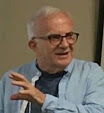 |
| Zen in Black and White Art Watercolor |
(Pinterest.com 570 x 814)
Hans Küng, a great 20th Century theologian, passed away last month in Tübingen. I remember a moving speech he gave at Riverside Church years ago. He described the spiritual desolation he has known after the Shoah. Someone asked him how anyone can believe in anything after the Holocaust. How can we believe in a higher vision, a nobler calling or a greater purpose for our lives?
He paused and breathed deeply. "I can understand those who turn away after this. But as for me, I can only go on because I believe in God. Belief in God helps me overcome such catastrophic events."
About the same time, I heard Dainin Katagiri, a Zen Roshi, speak about our situation. Contemporary civilization is like a rider who storms through a village on a runaway horse. People shout, "Where are you going?" He yells back, "Ask the horse!"
Once we were confident of our purposes and destiny. We trusted the advances won by education, the inventions spawned by technology and the idealism generated by liberal faith. For lots of reasons, this confidence has been shaken. The vast gains of knowledge, our technological strides, and the rich accumulations of centuries of cultural development — these only render more tragic our present disarray.
Ask the horse! We find ourselves in a world we can neither fully understand nor can reject as unintelligible. We are driven by goals we cannot hope to reach yet cannot accept as unreachable. We teeter between belief and unbelief, between an almost limitless faith in our own abilities and a disgust at the pettiness, stupidity and cruelty of a race bent on conflict and destruction. Hatred - and fear - in countless variations perpetuate human degradation.
Ask the horse! Shall we agree with Thomas Hobbes that human life is "solitary, poor, nasty, brutish and short”? Or reconcile ourselves to what Sigmund Freud called the “normal unhappiness” of human existence?
For Küng, “No!” “Belief” means we may expect to know someday the answer to the question first posed by Leibniz: “Why is there something and not nothing?” For Katagiri, “No!” as well. “Liberation” comes in realizing that “something” and “nothing” are the same. For both Küng and Katagiri, the suffering of this world can awaken deep compassion in us. Compassion is the bridle that controls the horse. For both savants, all striving for justice is absolutely justified. For each of them, in vastly different ways, truth will be known and divisions will be overcome.
© Gilbert Friend-Jones














